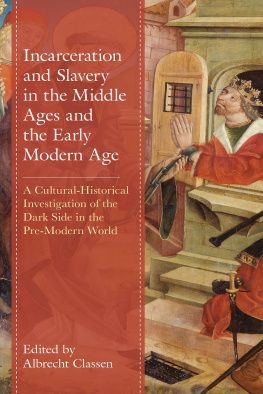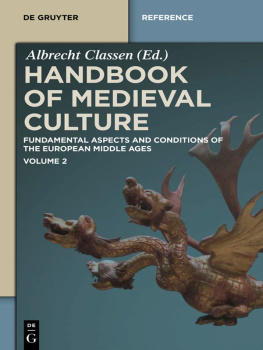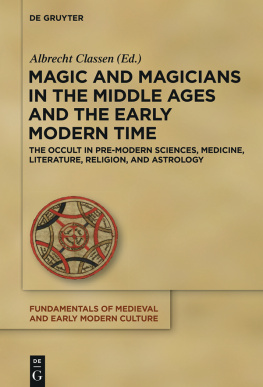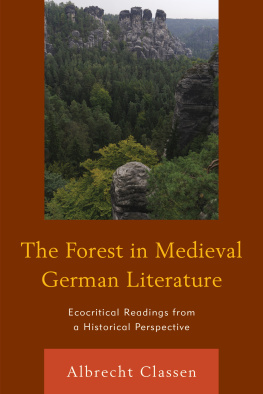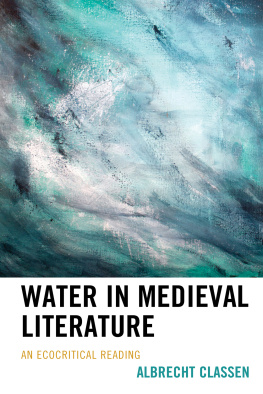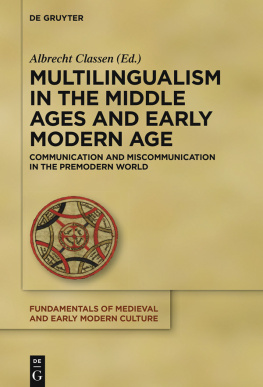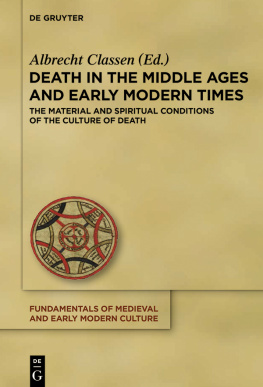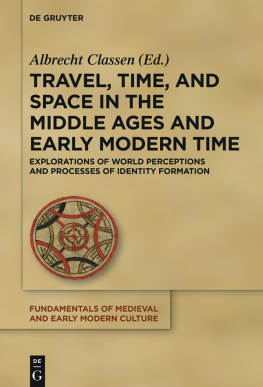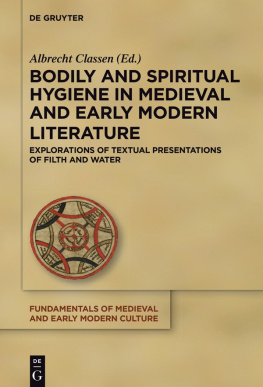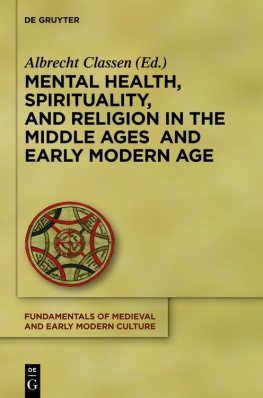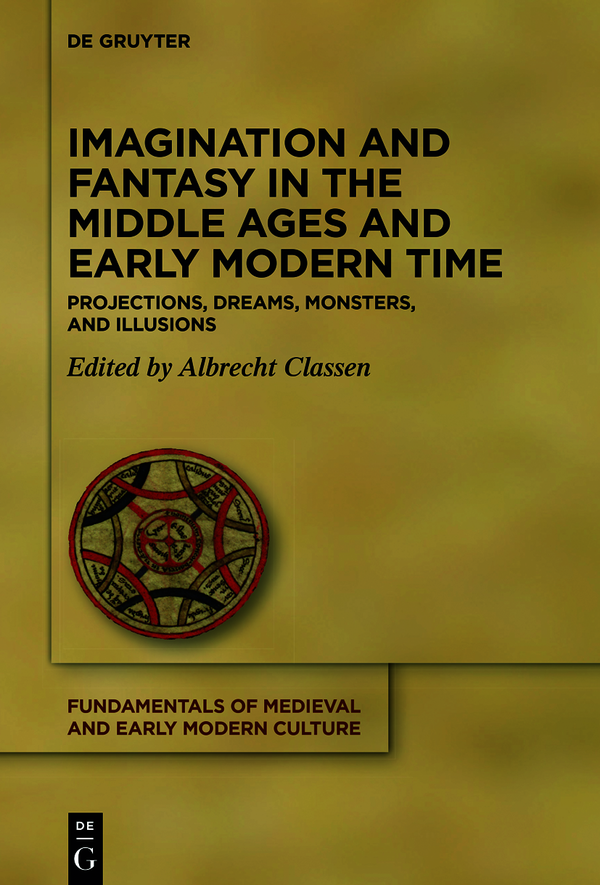The Deutsche Nationalbibliothek lists this publication in the Deutsche Nationalbibliografie; detailed bibliographic data are available on the Internet at http://dnb.dnb.de.
Imagination, Fantasy, Otherness, and Monstrosity in the Middle Ages and the Early Modern World
New Approaches to Cultural-Historical and Anthropological Epistemology. Also an Introduction
Albrecht Classen
University of Arizona , Tucson , USA
The following is more than a mere introduction; instead, it represents a comprehensive analysis of what imagination and fantasy might have meant in the Middle Ages and beyond, touching on many different literary texts, art works, religious concepts, and philosophical notions past and present. As the issue at stake is so comprehensive, research has already been very active in coming to terms with it. Below I will provide an extensive literature review and present detailed and extensive discussions of many different relevant sources. To help the reader, I start with a table of content for this contribution only.
Because you try to penetrate the shadows,
he said to me, from much too far away,
you confuse the truth with your imagination.
(Dante, Inferno, XXXI, vv. 2224)
Prove true, imagination!
That I, dear brother, be now taken for you!
(Shakespeare, Twelfth Night, Act 3, Scene 4).
Theseus: More strange than true. I never may believe
These antique fables nor these fairy toys.
Lovers and madmen have such seething brains,
Such shaping fantasies, that apprehend
More than cool reason ever comprehends.
The lunatic, the lover, and the poet
Are of imagination all compact.
One sees more devils than vast hell can hold
(Shakespeare, A Midsummer Nights Dream, Act 5, Scene 1).
Outline and Structure
In this introductory study, in a way a little book by itself, I will create a mental roadmap for the entire volume by examining a wide range of documents, art works, theological reflections, and philosophical ruminations that allow us to examine critically the meaning of imagination, fantasy, otherness, and monstrosity as we can observe those aspects in the Middle Ages and the early modern age. As much as possible, I will also attempt to lay the foundation for theoretical reflections on those phenomena and to identify them as important elements for many scholars working in the pre-modern era. After all, human life is the result both of the material conditions we live in and of the projections of our own selves upon the world stage. Mind and matter are intricately intertwined with each other, which cultural historians have always to keep in mind when they look at the phenomena of their investigation. We create our own lives and are the products of life itself, however we might want to define it (God, nature, life as an independent entity, the political system, the local community, school, etc.). We could hence postulate that imagination and fantasy represent the dimension behind the public stage where we normally operate, consciously and unconsciously, and yet we all know that it takes only a small step behind the scene to recognize the full scope of all existence comprising both the material and the immaterial aspect.
Most editors of other similar volumes containing the studies collected from a pool of papers presented at a conference or a symposium are normally content with outlining briefly the theoretical and cultural-historical framework relevant for the central topic, but then they step aside and give all the room to the contributors. My intention here, by contrast, as in all previous volumes in our series, is to go into detail, to stake out the entire field, to provide insights into the widest range possible of the critical documents and sources, to reflect thoroughly on the current state of research, and to outline how the subsequent contributions can be embedded in this framework. In a way, this is a broadly conceived attempt to establish the foundation for the investigation of this fundamental topic. A complete coverage of everything ever published on imagination and fantasy in the pre-modern world cannot, of course, be expected, but I hope to lead us deeply into this field by engaging with a vast gamut of relevant texts and images from that time period and by reflecting on the relevant international research literature from past and present.
To reflect on the workings of ideology and its mental grounding, it does not really matter what a politician, or even the pope, says in specific terms, but how the words resonate with the audiences fantasy and imagination. Throughout time, major leaders, kings, emperors, generals, dictators, or other types of rulers have been so successful in gaining control and command over their people not necessarily because of their physical might, intellectual ruse, or operational skills, as important as all those aspects might have been, but because of their charisma and thus their ability to reach out to peoples sense of identity or lack thereof, whether we think of Alexander the Great, Charlemagne, or the fictional King Arthur. All those figures continue to evoke even modern fantasies and are the foundation of much historical imagination.
If a leader knows how to address deeply hidden desires, fears, or hopes, or understands how to stoke those artificially, then the masses have always willingly followed him/her, such as the Crusader knights or the absolutely loyal troops under the Mongol ruler Genghis Khan. Even though there is no room here to pursue this psychological-historical perspective at length, we can easily recognize the profound relevance of human imagination and fantasy which often drive cultural and political developments more extensively than rationality, mechanical processes, and physical objects, such as money.
Fear of immigrants, asylum seekers, new settlers, or outsiders/minorities, especially of Jews, has always been driven by nationalistic, in-group fantasies, both in the Middle Ages and today, as most dramatically illustrated currently by the fanaticism of the conservatives in the United States, especially under President Donald Trump, to defend their country from that ominous wave of brown people that seems to threaten the national identity or the existence of the entire country; and hence the desperate desire to build a wall that would stop all pathogenic dangers arising from the south, a rhetoric we are, unfortunately, so familiar with from the time of the Hitler regime in Germany.
The masses, as Gustave le Bon had already observed a long time ago, have always been manipulable because they are dangerously subject to their own and alien emotions and dreams and need a leader who promises to actualize those for them if they only follow him/her. The pre-modern era was not an exception to this phenomenon, although we cannot simply equate the modern masses with the people living in the Middle Ages within a feudal system. After all, every type of society depends on a strong leader who knows how to instrumentalize peoples dreams and desires and to transform them into some kind of reality. Nevertheless, this is, basically, the stuff myths are made of, and they have worked just as well in antiquity as well as in the Middle Ages, not even to talk of the twentieth or twenty-first century. Both mass enthusiasm and mass panic (Crusades, anti-Judaism, Hussite wars, etc.) as well as political movements of many different kinds prove to be based to a large extent on emotions and imagination, which a ruthless and calculating leader knows exceedingly well how to utilize for his/her own purposes.


